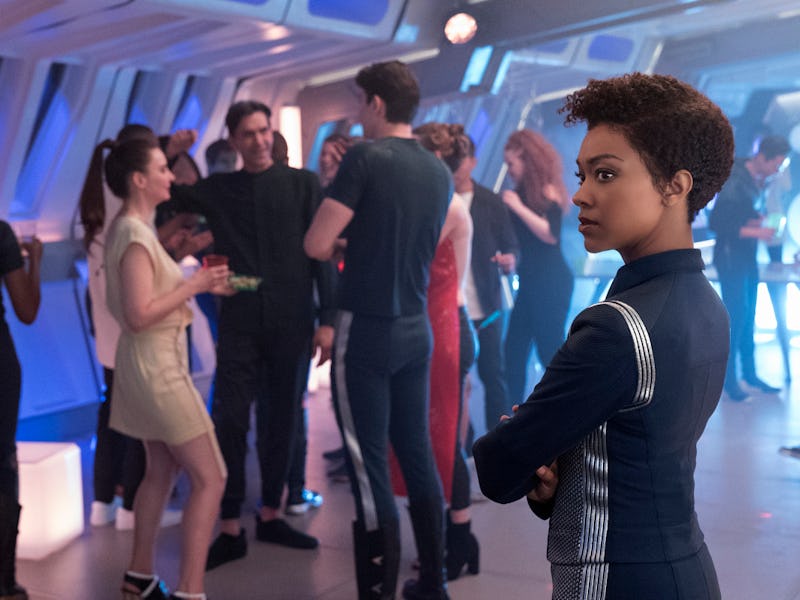‘Star Trek: Discovery’ Episode 7 Will Easily Silence the Haters
The optimism has been officially beamed-up.

If you haven’t seen Star Trek: Discovery, there are essentially two narratives you’ll get from both casual fans and super-Trekkies. Some will say the show is great and continues the Trek franchise is a bold, unexpected direction. Others will tell you the show is entertaining enough, but that because of its darkness, “it’s not real Star Trek.” But, with the airing of the seventh episode — “Magic to Make the Sanest Man Go Mad” — Discovery has hit its stride with an episode that is upbeat and charming enough to make even the toughest in that hater camp smile with Trekkie pride.
Spoilers for Star Trek: Discovery episode 7 ahead.
Borrowing heavily from the structure of 1992 The Next Generation episode “Cause and Effect”; this episode finds the USS Discovery caught in time-loop in which the same 30 minutes are repeated over and over again. But, unlike “Cause and Effect,” there’s a dastardly mastermind behind the time-loop. Rainn Wilson is back as Harry Mudd, and yes, he wants revenge because Captain Lorca ditched him in that Klingon prison two episodes ago, but he’s really more interested in making some quick cash. After hiding in the belly of a space whale, Mudd zaps some “time crystals” to create a time-loop for the sole purpose of figuring out how to totally override all of Discovery’s security protocols and take control of the ship so he can sell it to the Klingons. Which is hilarious.
Lorca surrenders the Discovery to Harry Mudd in one of the time-loops.
The fact that Mudd uses a really complicated form of time-travel just to figure out how to rip-off a starship is sci-fi comedy gold. Obviously, it’s the most short-sighted use of time-travel of ever, but also delicious social commentary. If actually time-loop causing crystals were available for purchase in real life, you can bet the first people to peddle them would be criminals on the dark web. Mudd using the awesomeness of the time-loop for this petty goal has shades of Kurt Vonnegut, Douglas Adams and Biff stealing the Sports Almanac in Back to the Future II. If the pilot episode of Discovery reminded you of the the darker moments of Battlestar Galactica, this episode feels more like Doctor Who.
By making the story contained in a time-loop, this episode gives Michael Burnham the chance to do something great: bond with a few of her crewmates in ways she couldn’t if this catastrophe hadn’t happened. This heartwarming idea is played out with smart Trek precision: the only way for the time-loop to be broken is for people like Burnham and Stamets to get out of their comfort zones and actually get to know each other. The metaphor here is painfully obvious, and Burnham perhaps puts it too on-the-nose in her closing monologue when she says “change begets change.” And yet, in real life, anyone caught in an emotional time-loop of their own making knows that the best way to break those negative cycles is usually through friendship, love, and original thinking. Ah, Star Trek, how we love you with your on-the-nose metaphors.
Scotty and Bones messing around in 'I, Mudd' (1967)
Seeing the crew of the Discovery work together to outsmart Harry Mudd also directly parallels the original series in which Kirk and the gang hand to team-up with Harry Mudd to defeat a bunch of paternalistic androids. And while that episode (“I,Mudd”) bordered on slapstick comedy, this episode plays things a little more straight.
But it’s still a lot of fun. In contrast with the rest of the series so far, this time-loop felt like a much-needed pause in the breakneck action and intrigue. For those watching the show only to gather clues for the season-long mysteries, this episode asked everyone to chill out for a second. Is Ash Tyler a Klingon in disguise? In this story, it didn’t really matter because he was just there to allow Burnham to feel something she’d never felt before; a real human crush.
Stamets tries to convince Burnham and Tyler of the time-loop.
There’s a lot that wasn’t addressed from the previous episode this time out. Lorca might still be a doppelganger of himself. No one mentions what happened to Admiral Cornwell after she got captured by the Klingons last week. But that’s all okay. Because for just one little time-loop, Discovery decided it needed to throw a party. And the result was a great science fiction story full of aliens and space whales that had the most human soul of all the episodes yet.
Star Trek: Discovery airs on Sundays at 8:30 eastern time on CBS All-Access*